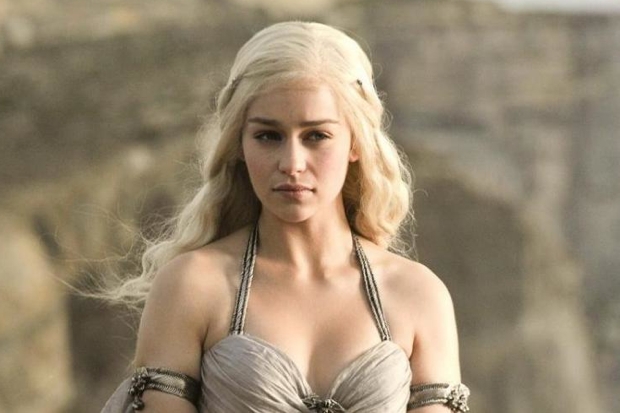Blimey, there has been so much good stuff to watch on telly of late: the Grand National, the Boat Race and the Masters; The Island with Bear Grylls; the final of University Challenge (bravura performance from Caius’s Loveday, though how the winning Cambridge team’s hearts must have sunk when they realised that the public intellectual chosen to present this year’s prize was that literary equivalent of a Dalí melting clock poster on a pretentious fifth former’s bedroom wall — Will Self); and, of course, the first episode of the new season’s Game of Thrones (Sky Atlantic, Monday).
I’m assuming you’re all on board with Thrones, now, and that it doesn’t need any introduction. Last season (the fourth) it overtook The Sopranos as the most watched series on HBO, so I imagine that by series 12 or 13 (presuming George R.R. Martin lives to write that many books and doesn’t get eaten in a tragic wolf accident) there will be no one left in the world who hasn’t at some time said to themselves: ‘I am Tyrion Lannister.’
Tyrion — played by the coolest, sex-iest dwarf in history, Peter Dinklage — is, of course, the character everyone wants to be because he’s about the only person in the entire series with a glimmer of human warmth. When you identify with Tyrion, what you’re saying to the world is: ‘Yeah, and if I’d been in Amsterdam in 1942 I’d have been the one who sheltered Anne Frank.’
Louche, witty, vulnerable, charming — and only ruthless (plot spoiler alert!) when he has no other option, as for example, when he’s forced to strangle his mistress and shoot his father with a crossbow — Tyrion is our one moral touchstone in an otherwise pitiless universe where weakness, kindness or decency are almost invariably punished by hideous death.
It’s one of the qualities that makes the series so utterly transfixing: as with Zoé Oldenbourg’s Crusades-era classic The World is Not Enough, you’re transported to a realm where all the usual cosy fictive conventions have been suspended. Anyone can die at any time — and quite often does (Thrones averages 14 deaths per episode) — and the correlation between good behaviour and happy endings is depressingly but exhilaratingly inverse. (As, perhaps, you’d expect from a saga whose plotlines are borrowed in part from the Wars of the Roses, where entire noble houses could be eradicated according to the outcome of a single battle.)
All that said, the opening episode of this new season was a relatively dull one. (Just one throat-slitting and one burning-at-the-stake.) It happens sometimes with Thrones — before the inevitable bloodbath later in the series. You’re given a bit of illus-ory quality time to get to know the characters while they’re still alive and planning a bright future, the better that you might care for them should they meet their likely sticky end.
One of the people I’d quite like to die — though for purely selfish reasons: she has delighted me enough — is the Mother of Dragons, Daenerys Targaryen. For one thing, she doesn’t show her breasts nearly often enough these days (did I read, somewhere, that Emilia Clarke has had a no-nudie clause written into her contract or is that a wanton slur?), and for another she’s just a frightful liberal fascist.
In the last series, with her dragons and her army of ‘Unsullied’ warrior eunuchs she captured the city of Yunkai, where a minority of effete aristocrats kept the majority in thrall as slaves. But all she has done is replace one tyranny with another: she won’t let the dispossessed toffs enjoy their traditional burial rites; she has banned the gladiatorial games which seem to have been this dismal desert hell hole’s only source of entertainment.
This is typical George R.R. Martin, mind. With a less sophisticated author, Daenerys would have remained just a fanciable bit of stuff for whom we all rooted (or, in the case of the boys, wanted to root). What his Daenerys shows, though, is that immensely high-minded do-gooders can often make the most insufferable zealots. As a candidate for the Iron Throne, she’s probably preferable to the scheming, petulant Cersei or the ineffably dull (but dispiritingly effective) Stannis — but only just. Imagine a world run by a sexier, more strident Harriet Harman, whose every whim was viciously enforced by a pair of evil, killer dragons: the novelty would soon pall, don’t you think?







Comments